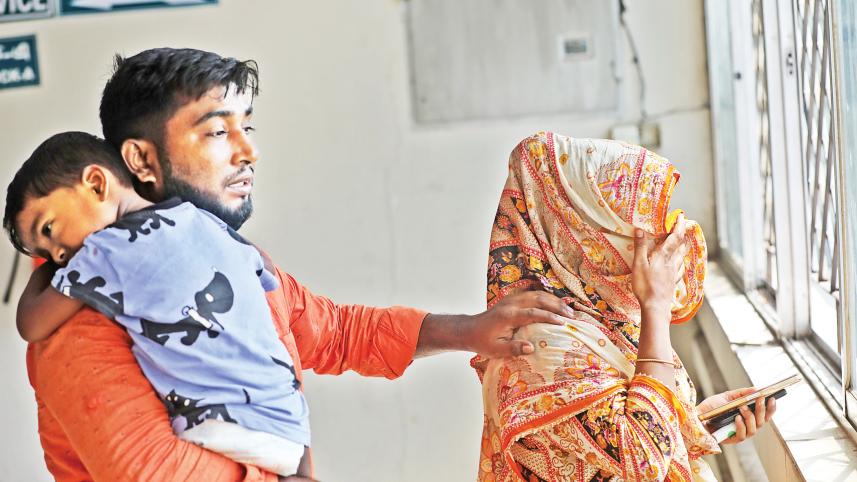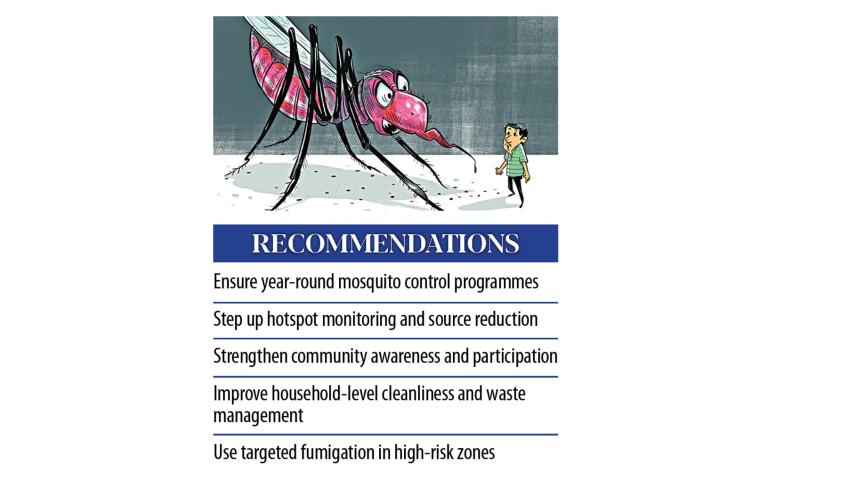Ongoing rains may worsen dengue crisis

Ongoing rainfall in October is expected to intensify the risk of dengue, with experts warning the situation may worsen in the coming months.
Last year, dengue peaked in October, remained prominent in November, and began declining in December. Experts fear the current rainfall pattern may lead to a similar or worse trend this year.
According to the Bangladesh Meteorological Department (BMD), light to heavy showers will continue for the next five days.
Between October 5 and 8, most divisions, including Chattogram, Sylhet, Dhaka and Rajshahi, are likely to see light to moderate rain, with some moderately heavy falls.
A BMD warning further stated that heavy to very heavy rainfall is likely in several divisions during the 48 hours from 3:00pm on October 2 under the influence of a deep depression over the Bay.
According to the Directorate General of Health Services (DGHS), dengue claimed at least 575 lives last year, with 1,01,214 hospitalisations.
The monthly breakdown shows 14 deaths and 2,669 cases in July, 30 deaths and 6,521 in August, 87 deaths and 18,097 in September, 135 deaths and 30,879 in October, 173 deaths and 29,652 in November, and 87 deaths and 9,755 in December.

This year so far, 202 people have died and over 48,491 have been hospitalised. DGHS reported 41 deaths and 10,684 cases in July, 39 deaths and 10,496 in August, 75 deaths and 15,866 in September, and four deaths with 886 cases in the first three days of October.
Entomologist GM Saifur Rahman said the recent rains may reverse the declining trend seen in August. "On-and-off rainfall creates breeding grounds for Aedes mosquitoes. Even light showers significantly increase populations," he said.
Mosquito populations expand quickly after rainfall, with a 15-day to one-month growth window, he said, adding, "If Aedes mosquitoes get a week after rain, a new generation emerges. Once matured, they can survive another 22–23 days, remaining infectious throughout that period."
Rahman stressed the need for personal protection measures -- nets, repellents, coils and sprays -- alongside targeted fumigation in hotspot areas.
Entomologist Kabirul Bashar of Jahangirnagar University warned that the dengue peak may be prolonged due to continuing rain, urging intensified source reduction, hotspot control and community engagement.
Brig Gen Imru-al-Quais, chief health officer of Dhaka North City Corporation, said patient lists from DGHS often contain incomplete or misleading addresses, sometimes including patients from outside Dhaka, such as Gazipur or Narayanganj. This, he said, diverts attention from actual hotspots inside the capital.
Spraying insecticide alone cannot control mosquitoes, he noted, stressing waste management and public awareness.
DNCC initiatives include patient data collection, hotspot marking, source-reduction programmes with BRAC, a dengue dashboard with rainfall-based risk models, and advocacy campaigns through imams, schools and volunteers.
According to DNCC, current measures include collecting patient data and marking hotspots, using community surveys, deploying traps, and conducting source-reduction programmes with BRAC volunteers.
DNCC has also launched a dengue dashboard showing hotspots, predictive models and rainfall-based risk analysis, alongside a chatbot for symptoms and free testing at 52 urban primary health centres.
Nishat Parvin, chief health officer at Dhaka South City Corporation, said their activities include larviciding, adulticiding, and awareness campaigns.
"We spray outside houses, but dengue mosquitoes often breed indoors, in hidden spots or seemingly clean areas. Without household awareness, controlling them is very difficult," she said.
Parvin added that while resources are sufficient, public participation remains weak. "People know what to do but don't always follow through. That's why we've strengthened both large-scale and small-scale campaigns."
She said the most vulnerable areas include parts of Old Dhaka, where abandoned or waterlogged houses harbour breeding grounds.
"Dengue won't disappear, but with year-round programmes, we can keep it under control," she said.




 For all latest news, follow The Daily Star's Google News channel.
For all latest news, follow The Daily Star's Google News channel.
Comments